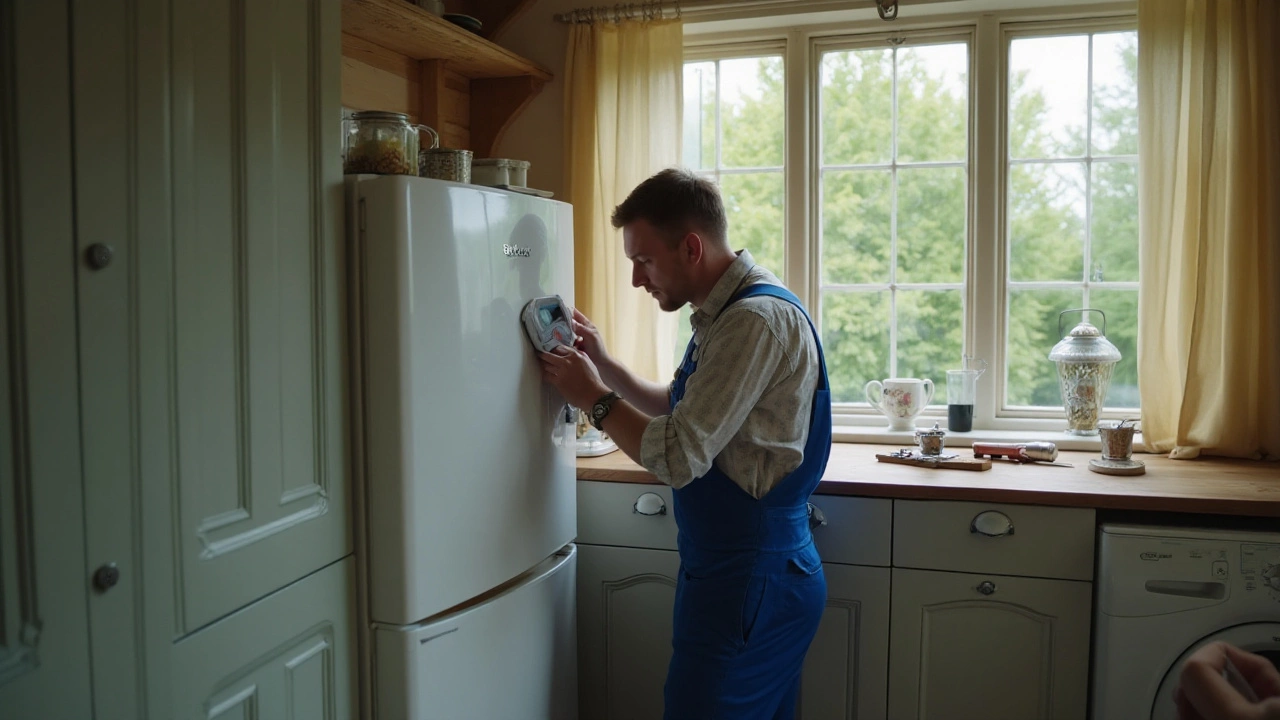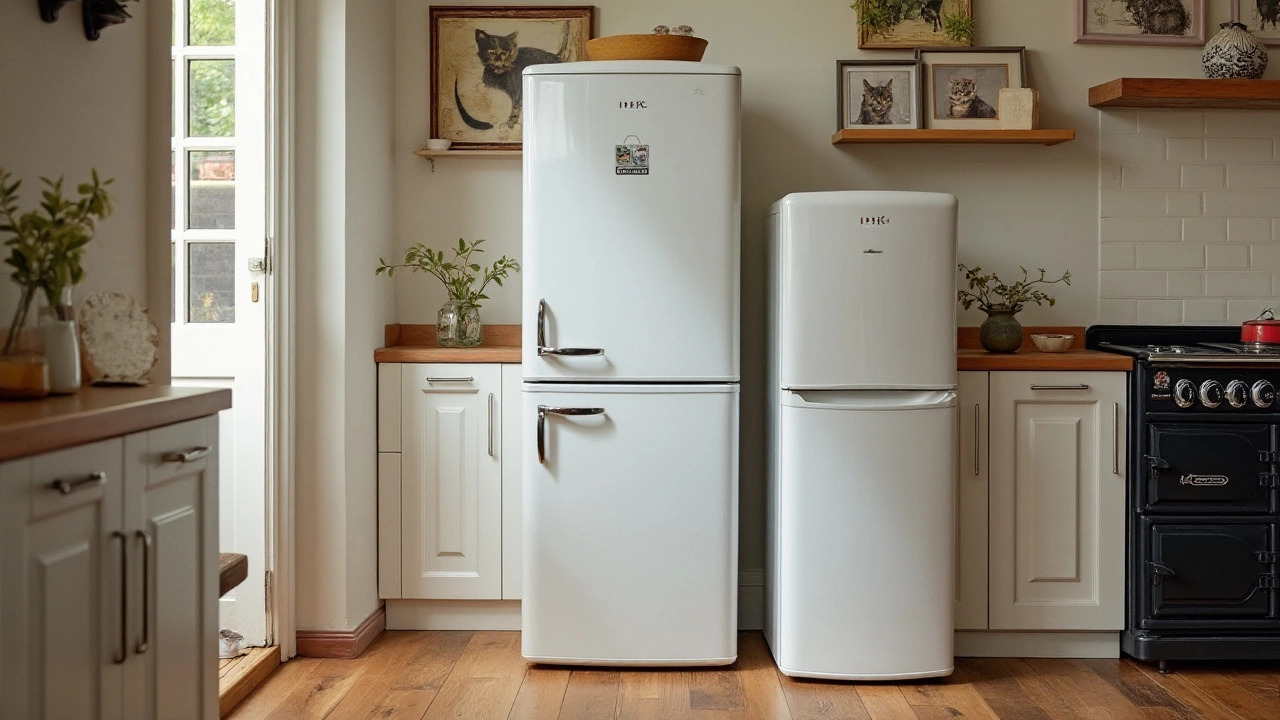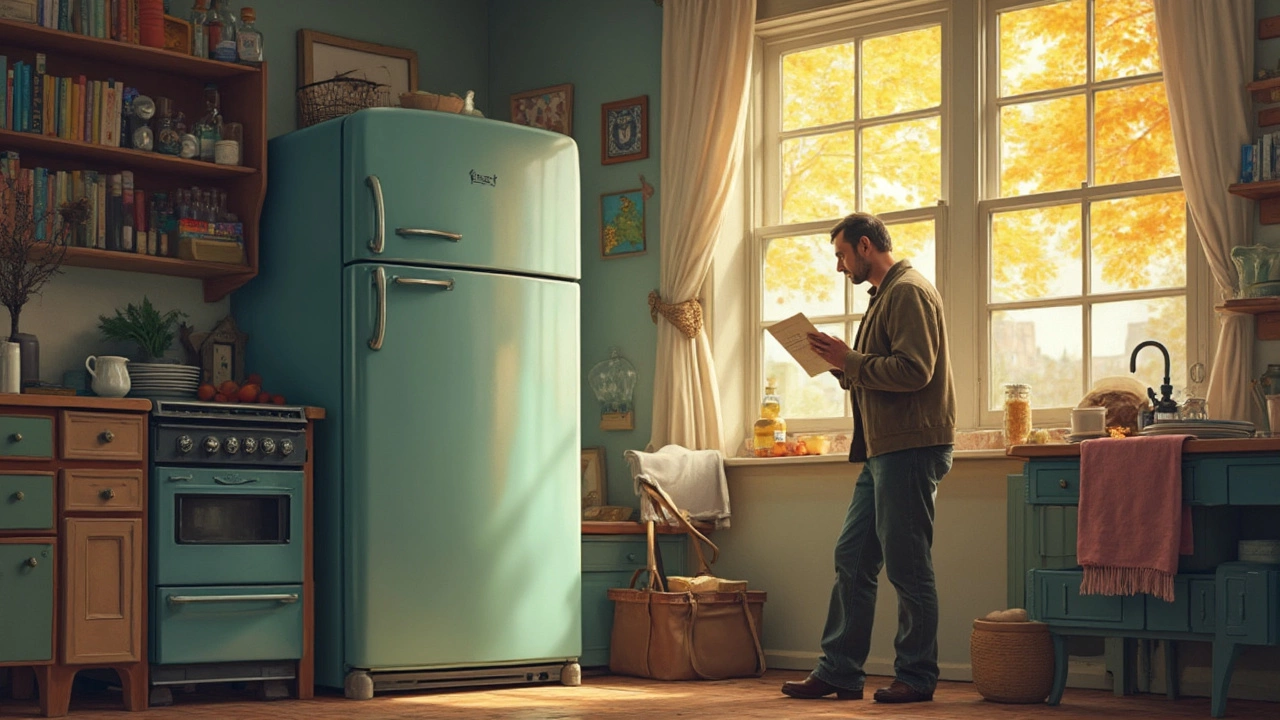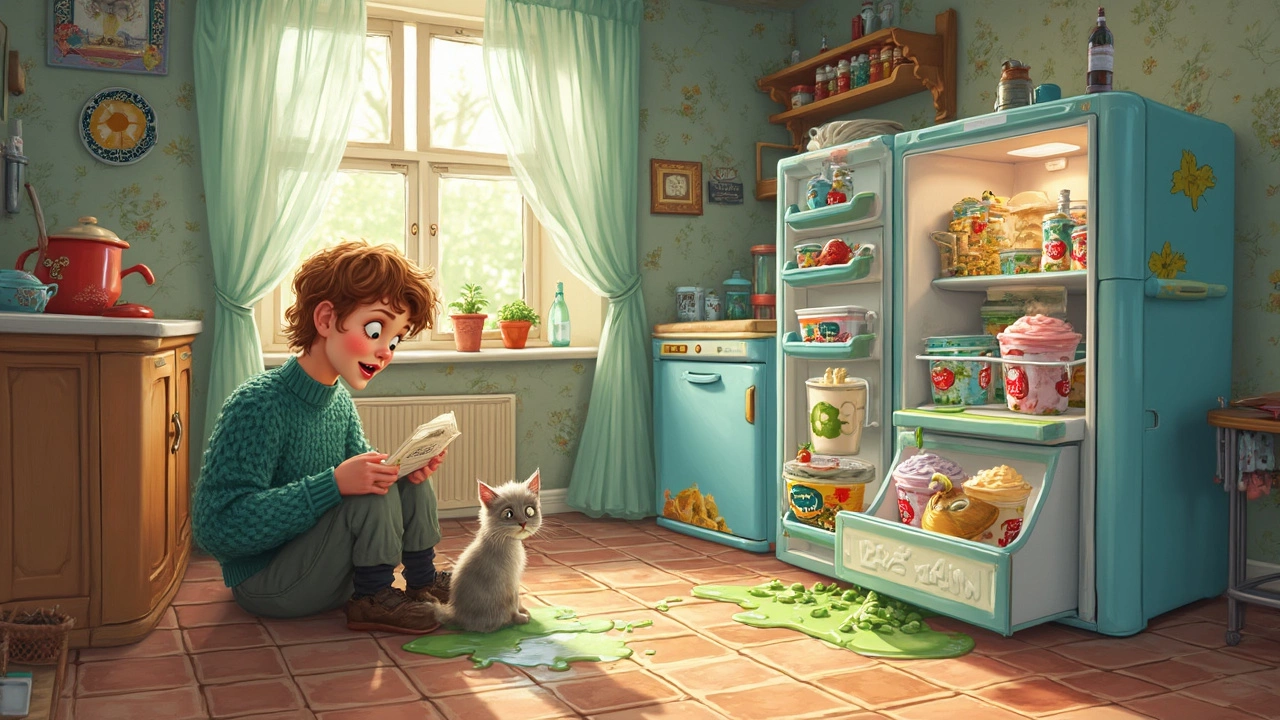
- 5 Oct 2024
- Gideon Thornton
- 0
The icy fortress of your frozen foods, your freezer, plays a key role in everyday life. So, when it starts acting up, you're left with the dilemma: to repair or to replace? It can be a tricky decision filled with potential costs and benefits on both sides.
Let's dive into the ins and outs of freezer care, from understanding common problems to figuring out when to let go. Is the issue something as simple as frost buildup, or are you hearing strange noises that could imply a more complex fault? Knowing the difference can save you a chunk of change.
We'll break down what repairs might set you back and take a look at how energy efficiency innovations could sway your decision. Plus, if you're the hands-on type, we'll offer a few quick troubleshooting tips to try before calling in the professionals. Ultimately, this guide will help you decide if you should repair your trusty appliance or start shopping for a newer model.
- Common Freezer Problems
- Cost of Repairs
- Signs It’s Time to Replace
- Energy Efficiency Considerations
- DIY Troubleshooting Tips
- Making the Final Decision
Common Freezer Problems
Freezers are indispensable when it comes to food preservation, but they're not without their quirks. One of the most frequent issues homeowners encounter is frost build-up. We've all seen it—those thick, icy sheets that seem to form out of nowhere. This isn't just an inconvenience; it can signify problems like poor sealing or temperature imbalances within the unit. If you find yourself defrosting your freezer more often than warranted, you might have a door seal that has seen better days. An improperly sealed door lets warm air in, which then condenses and freezes. A quick test could save you the cost and hassle of a bigger repair: insert a piece of paper between the door seals—if it slips out without resistance, it's time to consider a replacement seal.
Another pesky problem is the strange noises that sometimes emanate from the freezer. A gentle hum is normal, but clanking, buzzing, or loud humming can indicate issues with the compressor or evaporator fan motor. These sounds should not be ignored as they often herald more significant, impending failures. Your freezer relies on these components to maintain the correct temperature. Listening to the noises and observing any consistent patterns—like more noise during peak usage times—can provide useful clues if you decide to call in a professional.
According to the U.S. Department of Energy, households can save money by addressing minor appliance issues early. "Keeping appliances in top-notch condition reduces energy usage and avoids costly repairs down the line," the report states.Additionally, temperature fluctuations can be another headache. If your freezer alternates between being an icebox and a sauna, it is more than just a matter of inconvenience. Frequent temperature changes can lead to spoiled food or inconsistent freezing patterns, affecting the overall efficiency. Checking the thermostat for accuracy or seeing if air vents are blocked by ice or frozen goods can sometimes solve these problems. Simple adjustments might bring back stability to your appliance.
There’s also the notorious water leak issue. Puddling around the base of the freezer can often be traced back to a clogged or frozen defrost drain. This problem is sneaky because it often goes unnoticed until it becomes significant. Regularly checking and ensuring the drain hose remains clear can avert this issue. Most times, the damage is minimal, but ignoring it for too long might lead to floor damage or mold—indirect costs that may add up quite quickly.
These freezer repair issues, while common, don’t always herald doom for your appliance. Many are simple to diagnose and fix with a bit of vigilance and routine maintenance. By staying informed about potential symptoms, you not only ensure a longer lifespan for your freezer but may also save on larger repair bills. Learning to identify these problems early can significantly affect both the longevity of your appliance and your wallet.
Cost of Repairs
Deciding whether to repair or replace a freezer can often come down to the numbers. The cost of repairing a freezer ranges widely depending on the problem and the model. Simple issues like a faulty thermostat or door seal might set you back around $50 to $200. However, when dealing with more complicated components like the compressor, costs can balloon to upwards of $500. Before you dive into repairs, it's essential to evaluate the extent of the damage and how it affects the appliance's overall performance. You'll want to weigh these costs against the freezer's current market value and your budget.
Understandably, many people might hesitate to repair a freezer when the price tag compares unfavorably to purchasing a brand-new unit. On average, a new mid-range freezer could cost between $500 and $1,500. It's important to note that if your freezer is more than a decade old and you're looking at a costly repair, a replacement could be more cost-efficient in the long run. Newer models often come with significant energy savings, which could lead to lower utility bills.
A smart first step is to get a detailed diagnosis from a trusted appliance technician to know the exact repair needs. Many will offer a full assessment and an estimate that includes both the parts and labor. It's also beneficial to get multiple quotes if possible to ensure you are not overpaying. Sometimes, minor fixes might suffice to keep your freezer humming smoothly for a few more years without the extreme expense of a total replacement.
"It's crucial to balance repair costs against the full lifecycle of the freezer. Investing in repairs for an older model might prove inefficient," advises John Pritchard, a renowned appliance repair specialist.
Another factor to consider is warranty coverage. If your appliance is still under warranty, the manufacturer might cover repair costs, eliminating that financial burden. Always check the warranty status before proceeding with any repairs as it might end up saving you significant amounts.
Let’s not forget about doing some part of the repair work yourself, if you're handy with tools. Basic problem-solving steps such as cleaning the coils, checking the power source, or defrosting the freezer can sometimes resolve issues at no cost. Always consult the user manual and follow all safety guidelines to avoid accidents. Repairing appliances isn't always an effortless task, but tackling basic maintenance could preserve your freezer's life just a bit longer.
Ultimately, choosing whether to repair or replace involves considering many aspects: the freezer's age, repair cost, and your long-term plans for the appliance. While repair might appear to save you money initially, sometimes starting fresh with a replacement provides a more valuable outcome over time.

Signs It’s Time to Replace
Recognizing when it's time to replace your freezer is essential to maintaining an efficient home. While repairs can often keep your unit running a bit longer, there comes a point when replacement is the wiser choice for long-term savings and peace of mind. So, what are the telltale signs that your trusty cooling box is ready for retirement? Let's explore some key indicators that suggest it's time to let go and invest in a new freezer.
One of the most apparent signs is the age of your appliance. Typically, freezers have a life expectancy of 10 to 20 years, though under ideal conditions, some may last even longer. If your freezer is creeping up to the two-decade mark or beyond, you may want to start considering a replacement, especially if you're noticing other issues. Older freezers are notorious energy hogs, lacking the efficiency standards of modern models. This leads us to another critical factor: energy efficiency.
Modern freezers are built with energy-saving technology that older models simply can't compete with. If you're frequently noticing that your energy bill has spiked, your freezer might be the culprit. According to the U.S. Department of Energy, upgrading to an ENERGY STAR certified freezer can save between 10 and 50% in energy costs compared to a non-certified model. While the upfront investment may seem daunting, the savings over time can more than make up for the initial cost.
"Energy-efficient models aren’t just good for the environment - they’re good for your wallet." - ENERGY STAR representative
Next up is the frequency of repairs. If you find yourself calling the repairman more often than not, it's time to crunch the numbers. Consider this: if the cost of repairs is more than half the price of a new unit, it makes more economic sense to replace it. Frequently repaired freezers not only drain your wallet but also reduce reliability, causing convenience and potential utility disruptions.
Noise is another significant indicator. Freezers are designed to operate quietly in the background. If yours is making loud banging, humming, or clicking noises, it may be a sign of serious mechanical issues. Noisy components could indicate fan motor issues, compressor failures, or more. While some noise can be dealt with by simple repairs, persistent or unfixable noise points to a necessary replacement.
Finally, consider the quality of the freezing function itself. Are foods taking longer to freeze? Is there excessive frost buildup? If your unit is struggling to maintain its temperature, it's not doing its job efficiently. Poor performance not only affects the quality and safety of your food but also requires more energy to function, further hiking up your energy bill.
When weighing the decision to repair or replace, consider these signs carefully. Investing in a new freezer can save money in the long run while providing improved performance and peace of mind. By understanding the signs, you can make an informed decision that best suits your needs and ensures your kitchen runs smoothly.
Energy Efficiency Considerations
When considering whether to repair or replace your freezer, diving into the world of energy efficiency is a must. Think of it as the heart rate of your freezer. If it's beating strong with energy efficiency, you might save money on repairs and electricity bills down the road. Freezers are household energy hogs, often running 24/7 to keep your food perfectly chilled. So, if your appliance is more than a decade old, it's probably guzzling energy faster than a new model would, as technological advancements over the years have greatly improved how devices freeze, conserve, and save energy. Newer models consume significantly less power than their older counterparts, and many include Energy Star ratings, a government-backed symbol for energy efficiency.
But what does energy efficiency truly mean for your choice? Higher efficiency doesn't just help the environment, it cuts down on your monthly electrical expenses. According to the U.S. Department of Energy, on average, an Energy Star-certified freezer will save up to 15 percent in energy costs over non-certified models. This can amount to reasonable savings each year, which you could compare to the cost of potential repairs required to keep an older freezer operational. It's these hidden savings that many people overlook when calculating the true cost of replacing versus repairing their unit. Aside from weighty utility bills, a struggling freezer's cooling components may need to work harder, causing wear and tear that will likely mean more frequent repairs. If left unchecked, repair costs might spiral out of control.
These modern models incorporate features developed to maximize efficiency, from advanced compressors to smart insulation and digital thermostats that offer precise temperature settings. For homeowners fastening for the long haul, assessing freezers for these capabilities can equip them with the foresight needed to make a smart decision. There are many styles to choose from that have innovated strategic air flows and optimized settings to keep your frozen goods at just the right temperature without going overboard. Freezer repair decisions, though tricky, have never been better timed with the multitude of options available. If you're still wondering if an upgrade is the right move, a comparison may help cement your decision.
"By replacing old appliances with models featuring the Energy Star label, families can significantly lower electricity usage and contribute to a healthier planet," states the Environmental Protection Agency.
In essence, equipping your house with an efficient freezer is a choice that ripples out into many areas. By curbing energy use, you're reducing your carbon footprint, enhancing savings, and even capturing a potential increase in home value with your greener, tech-savvy approaches. Weighing these aspects might tip the balance of whether it's worthwhile to repair your older freezer or move on to a newer, more efficient solution. Contemplate this well as you strap in for your upcoming decision.

DIY Troubleshooting Tips
Before you throw in the towel and call an expensive repair service, there are a few do-it-yourself troubleshooting techniques that can save both time and money. These basic checks and tweaks might just bring your freezer back from the brink of an icy meltdown. One of the first steps you should consider is checking the power supply. It's often the simplest things that trip us up, like a loose plug or a tripped breaker. Make sure your freezer is securely plugged in and check your home's electrical panel to ensure all circuits are active and not blown. Sometimes, it could be as simple as flipping a switch to restore power and functionality. This might seem like a no-brainer, but verifying the basics can prevent unnecessary panic.
Another culprit in freezer dysfunction could be its thermostat. If your freezer isn't freezing as efficiently as it should, or it's freezing too much, it might be due to a thermostat that's set incorrectly or malfunctioning. To check this, locate your freezer's thermostat dial. Try adjusting it slightly warmer or cooler than its current setting –and then wait a few hours to see if there’s a noticeable improvement. If the temperature fluctuates or remains inconsistent, a replacement part might be needed. Bear in mind that this little gadget is the brain of your appliance, directing its cooling behavior. An easy remedy could be recalibrating it or, in worse cases, replacing it altogether.
Freezers are also quite prone to the infamous issue of frost build-up. This happens when warm air finds its way inside and condensates, leading to excess frost. Check the door seals for any cracks, stiffness, or dirt buildup, because a tight seal is what keeps that frost at bay. If you observe any damages, consider replacing the seal – a task that can be accomplished with some readily available materials and a bit of dexterity. Always remember to close the door firmly after use. Just think of how many times it has saved your leftovers and try giving it a little extra attention.
"As most consumer guides suggest, a freezer that suffers from frequent frost issues often has compromised gaskets or seals," stated a 2022 report from Consumer Reports.
Another vexing problem could be unusual noises emanating from your freezer. Strange sounds often point to a fan blade that's come into contact with debris or ice. To inspect this, unplug your freezer and check the evaporator fan, typically located behind an interior panel. If you ever notice debris, carefully remove it, ensuring the fan's path is clear and unobstructed. This quick adjustment might soon silence the rattles and screeches you’ve been hearing.
For those who love their tools, a multi-meter can be an invaluable friend to check for continuity in freezer components, such as the defrost timer, heater, or thermostat. These elements regulate freezer function and safety. If any of these parts fail the continuity test, it's an indicator that a replacement is required. Freezer repair doesn’t have to be a daunting task and tackling these specific issues can often breathe new life into your appliance without burning a hole in your wallet.
Making the Final Decision
When it comes to the moment of truth, deciding whether to repair or replace your freezer requires a mixture of logic and a bit of gut feeling. You've lived with your freezer, filled it with family meals, and counted on it during midnight cravings. But now the question looms large: is it worth keeping this appliance running, or is it time to say goodbye and bring a new one home? There are several factors to consider, and it's not purely a financial decision as the impact on your daily life and energy costs can also weigh heavily.
First and foremost, the issue of cost isn't just about the price tag on a new freezer. It's about comparing that cost to the ongoing expenses related to your current machine. If you've got a freezer that's nearing or has exceeded the decade mark, you should know that components might begin to fail more frequently. However, repair costs need careful scrutiny; if you're frequently paying high fees, it might not be worth it. But what about the potential savings in energy? Newer models are far more energy-efficient than those made a decade ago, which could lead to notable savings on your utility bills. Consider this: the average household can reduce energy usage by approximately 20% by opting for newer and more efficient appliances. Plus, as energy efficiency standards have improved, the environmental impact of newer freezers also tends to be lower, meeting stricter energy regulations.
A study from the Natural Resources Defense Council suggests, "Updating old appliances could save Americans almost $4 billion annually on energy costs."
Next, think about dependability and durability. An older freezer with regular maintenance might still be running perfectly fine, which could afford you a few more years before replacement becomes urgent. But if reliability is a problem, the risk of a future breakdown could weigh heavily. Unplanned repairs always seem to happen at the most inconvenient times. On top of that, consider the assurance that comes with a new appliance's warranty, which can often offer substantial peace of mind for a few years after purchase.
Finally, it's crucial to consider your personal situation. If your freezer has sentimental value or serves a critical role in your life due to its size or placement within the kitchen, this might influence your choice. While there isn't a one-size-fits-all answer, making the final decision often comes down to analyzing the balance between costs, efficiency, and reliability, weighed with your needs and lifestyle. As with many aspects of adult life, the 'right' decision varies for everyone—what matters is making the right decision for you, your family, and your home.



